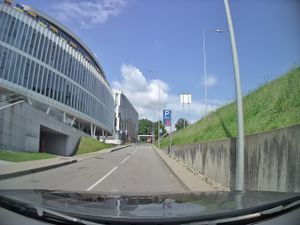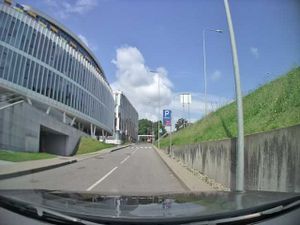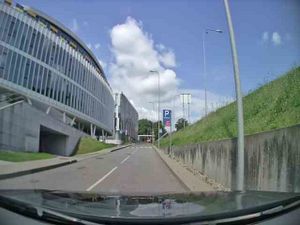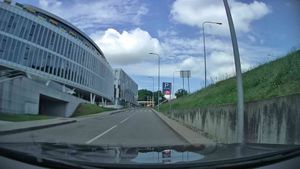Camera Manual: Difference between revisions
No edit summary |
|||
| (8 intermediate revisions by 2 users not shown) | |||
| Line 10: | Line 10: | ||
'''2. Sticky Tape 3M''' - option no. 1, a double sided sticky tape that can be used to stick the camera unit to the windscreen, this will allow it to be taken off later on without traces. | '''2. Sticky Tape 3M''' - option no. 1, a double sided sticky tape that can be used to stick the camera unit to the windscreen, this will allow it to be taken off later on without traces. | ||
'''3. Screws''' - option no. 2, screws which can be used to screw the camera unit into the designated place just above the windscreen (should not be used on windows). | '''3. Screws''' - option no. 2, screws which can be used to screw the camera unit into the designated place just above the windscreen (should not be used on windows). | ||
| Line 25: | Line 26: | ||
5. [[DualCam Firmware errata|'''DualCam Firmware errata''']] - every once in a while an update comes out which improves the functionalities of the DualCam systems and even introduces new ones. It is important to keep track of what is released in order to receive the most out of your DualCam solution. | 5. [[DualCam Firmware errata|'''DualCam Firmware errata''']] - every once in a while an update comes out which improves the functionalities of the DualCam systems and even introduces new ones. It is important to keep track of what is released in order to receive the most out of your DualCam solution. | ||
6 | 6. [[DualCam FAQ|'''DualCam FAQ''']] - sometimes there will be rising questions to which the answers can not always be found. So a FAQ page has been released in order to collect non-standard information and potentially solve issues that the client might be facing. | ||
==Product Specification== | ==Product Specification== | ||
| Line 61: | Line 60: | ||
<td style="width: 8%; text-align:left">Supported microSD card sizes</td> | <td style="width: 8%; text-align:left">Supported microSD card sizes</td> | ||
<td style="width: 8%; text-align:left">16 GB, 32 GB, 64 GB</td> | <td style="width: 8%; text-align:left">16 GB, 32 GB, 64 GB</td> | ||
</tr> | |||
</tr> | |||
<td style="width: 8%; text-align:left">Microphone</td> | |||
<td style="width: 8%; text-align:left">Voice recording (Not installed in standard modification. Can be added on demand)</td> | |||
</tr> | </tr> | ||
<tr></table> | <tr></table> | ||
| Line 94: | Line 97: | ||
<tr> | <tr> | ||
<td style="width: 8%; text-align:left">Picture resolution</td> | <td style="width: 8%; text-align:left">Picture resolution</td> | ||
<td style="width: 8%; text-align:left">1280 x 720 (default) | <td style="width: 8%; text-align:left">1280 x 720 (default) Configurable: 160 x 120; 320 x 240; 640 x 480; 1920 x 1080</td> | ||
</tr> | </tr> | ||
<tr> | <tr> | ||
| Line 110: | Line 113: | ||
<tr> | <tr> | ||
<td style="width: 8%; text-align:left">Video resolution</td> | <td style="width: 8%; text-align:left">Video resolution</td> | ||
<td style="width: 8%; text-align:left">720P | <td style="width: 8%; text-align:left">720P </td> | ||
</tr> | </tr> | ||
<tr> | <tr> | ||
<td style="width: 8%; text-align:left">Video storage</td> | <td style="width: 8%; text-align:left">Video storage</td> | ||
<td style="width: 8%; text-align:left">2psc. MicroSD card (Max 64GB up to | <td style="width: 8%; text-align:left">2psc. MicroSD card (Max 64GB up to 40 hours of video)</td> | ||
</tr> | </tr> | ||
</table> | </table> | ||
| Line 214: | Line 217: | ||
| rowspan="1" style="text-align: center; style=" width: 150px; background: white; color: black;" |Front mp4 - 570KB, h265-495KB / Front mp4 - 531KB, h265-417KB | | rowspan="1" style="text-align: center; style=" width: 150px; background: white; color: black;" |Front mp4 - 570KB, h265-495KB / Front mp4 - 531KB, h265-417KB | ||
| rowspan="1" style="text-align: center; style=" width: 150px; background: white; color: black;" |76s / 102s | | rowspan="1" style="text-align: center; style=" width: 150px; background: white; color: black;" |76s / 102s | ||
| rowspan="1" style="text-align: center; style=" width: 150px; background: white; color: black;" | | | rowspan="1" style="text-align: center; style=" width: 150px; background: white; color: black;" |[[File:480865 Dualcam apkirptas.mp4]] | ||
|- | |- | ||
| rowspan="1" style="text-align: center; style=" width: 150px; background: white; color: black;" |1280x720 | | rowspan="1" style="text-align: center; style=" width: 150px; background: white; color: black;" |1280x720 | ||
| Line 277: | Line 280: | ||
'''* NOTE''' Image compression is a type of data compression applied to digital images, to reduce their cost for storage or transmission. Algorithms may take advantage of visual perception and the statistical properties of image data to provide superior results compared with generic data compression methods which are used for other digital data. | '''* NOTE''' Image compression is a type of data compression applied to digital images, to reduce their cost for storage or transmission. Algorithms may take advantage of visual perception and the statistical properties of image data to provide superior results compared with generic data compression methods which are used for other digital data. | ||
[[Category: | [[Category:Teltonika DualCam]] | ||
Latest revision as of 11:20, 19 September 2023
Main Page > Video Solutions > Teltonika DualCam > Camera ManualPackage contents
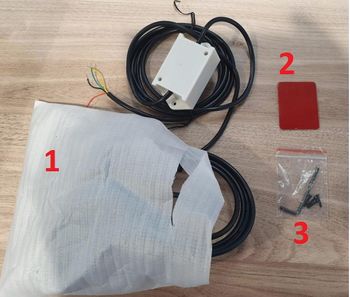
There are several components included in the DualCam package box. These components are necessary to set up the camera and make it functional part of the vehicle.
1. Teltonika DualCam - the main camera unit used to record video/pictures. This unit has cable attached to it for connection purposes e.g. powering up and data transmission. 2. Sticky Tape 3M - option no. 1, a double sided sticky tape that can be used to stick the camera unit to the windscreen, this will allow it to be taken off later on without traces. 3. Screws - option no. 2, screws which can be used to screw the camera unit into the designated place just above the windscreen (should not be used on windows).
Important Set-up links
1. First Start - in this section it is described how to set up the camera before first use. It is essential to know the process as without certain set-up processes the camera will not start or certain functions will not be accessible.
2. DualCam Configuration - this section describes the navigational way inside of the configurator which will be the main tool to set up the camera with the tracking device and make it functional.
3. DualCam Communication Protocol - is used when setting up file upload to servers for quick downloading of data. It is essential part and functionality of the FMX tracking devices family which allows the users to upload data and files from the device effortlessly.
4. DualCam SMS commands - in this section there are SMS sending commands which will help the user by providing easier access to command the device, or request information from it.
5. DualCam Firmware errata - every once in a while an update comes out which improves the functionalities of the DualCam systems and even introduces new ones. It is important to keep track of what is released in order to receive the most out of your DualCam solution.
6. DualCam FAQ - sometimes there will be rising questions to which the answers can not always be found. So a FAQ page has been released in order to collect non-standard information and potentially solve issues that the client might be facing.
Product Specification
| Technical data | Description |
|---|---|
| Supported by | FMC125, FMB125, FMB225, FMC225 |
| Day & Night Vision Effect | Day (Color), Night (Black & White) |
| Angle of View | Horizontal 120°, Vertical 70° |
| Dual Camera | Front and Rear (equal characteristics) |
| Camera casing dimensions | 126.2 x 36.6 x 36.6 mm |
| Camera mounting | Sticky tape (3M) or screws |
| Supported microSD card sizes | 16 GB, 32 GB, 64 GB |
| Microphone | Voice recording (Not installed in standard modification. Can be added on demand) |
| Electrical parameters | Description |
|---|---|
| Input voltage range | 9 ~ 36 V |
| Working temperature and humidity | Temperature: -30 °C ~ 85 °C
Humidity: <90% |
| Power consumption | 220 mA |
| Function parameters | Description |
|---|---|
| Real time clock (RTC) synchronization | Available over FM (via NTP, NITZ or GNSS) |
| Picture resolution | 1280 x 720 (default) Configurable: 160 x 120; 320 x 240; 640 x 480; 1920 x 1080 |
| IR Distance | 2 Meters |
| Cable length | RS232 (3.5 m) |
| Video compression | H.265 |
| Video resolution | 720P |
| Video storage | 2psc. MicroSD card (Max 64GB up to 40 hours of video) |
DualCam data transfer timing
* NOTE: This approximate time which we receive during testing in real cases can be different.
* NOTE Image compression is a type of data compression applied to digital images, to reduce their cost for storage or transmission. Algorithms may take advantage of visual perception and the statistical properties of image data to provide superior results compared with generic data compression methods which are used for other digital data.

